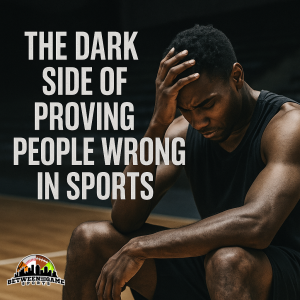Written by Will Johnson, November 5, 2025
In sports, the phrase “prove them wrong” is like fuel. It’s stitched into highlight reels, echoed in locker rooms, and repeated by athletes who’ve been counted out. The idea is simple: when others doubt you, silence them with performance. On the surface, it’s motivational. But beneath the surface lies a much darker reality—a mental and emotional toll that often goes unseen. Trust me, I lived this. It takes a toll on you, but that’s a story for another blog on another day.
The drive feels like a burden. When someone tells you, “you’re not good enough,” it lights a fire. But that fire doesn’t always burn clean. Instead of chasing greatness for the love of the game, athletes often shift their purpose toward silencing critics. Every rep, every sprint, every late night in the gym becomes less about growth and more about revenge. At first, that chip on the shoulder feels like power. But over time, it turns into weight—a heavy, suffocating reminder that your self-worth is tied to proving someone else wrong.
All of a sudden, that emotional pain of validation creeps in. Living for validation is dangerous. In sports, where criticism is constant, the emotional pain can run deep. Anxiety before games – not because you want to win, but because you’re terrified of giving your doubters more ammunition. Isolation – because your motivation comes from outside voices, not inner peace. Emptiness after victory – you “proved them wrong,” but the feeling doesn’t last. The doubts always return. This cycle leaves athletes in a constant state of emotional exhaustion, chasing approval that never truly satisfies.
What fans don’t realize is that proving people wrong is rarely a single victory—it’s a never-ending chase. Even when you silence one critic, another rises. The mental strain looks like overtraining injuries – pushing your body past its limit because you’re terrified of being exposed, mental breakdowns – when the pressure to validate yourself becomes unbearable, and finally the loss of joy – the game you once loved starts to feel like punishment instead of passion.  And in the age of social media, the noise never stops. Every post, every comment becomes another battle to fight. From high school athletes desperate to earn scholarships, to professionals fighting for contracts, countless players have walked this path. Some succeed on paper—stats, trophies, accolades—but behind closed doors, the battle scars of mental health, broken confidence, and emotional fatigue tell a different story.
And in the age of social media, the noise never stops. Every post, every comment becomes another battle to fight. From high school athletes desperate to earn scholarships, to professionals fighting for contracts, countless players have walked this path. Some succeed on paper—stats, trophies, accolades—but behind closed doors, the battle scars of mental health, broken confidence, and emotional fatigue tell a different story.
Even legends of the game have admitted to struggling with this dynamic. The drive to prove doubters wrong helped them succeed—but it also haunted them long after their careers ended.
Young athletes, I implore you to find a healthier purpose. The truth is, proving people wrong can spark a moment, but it can’t sustain a career or a life. At some point, athletes must reframe their purpose. Instead of playing to silence critics, they need to play to elevate themselves—to honor their love of the game, their teammates, and their personal growth.
The shift comes when motivation is rooted in passion rather than pain. When athletes embrace the joy of competing, the opinions of others lose power. That doesn’t mean the doubts disappear—it means they no longer control you. Proving people wrong might get you started, but it will break you if it’s the only fuel you run on. The dark side is real: emotional pain, mental strain, and a loss of joy in the game.
The challenge for athletes today isn’t just about training the body—it’s about protecting the mind. True success comes not when the critics are silenced, but when the athlete no longer needs their voices to feel validated.

